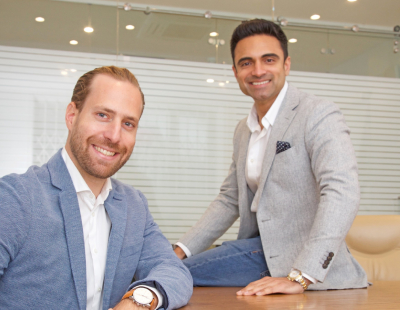You say that Brexit has been worse for business than the pandemic - can you explain why?
“The Covid-19 pandemic pressed the pause button on the housing market during the three lockdowns, however, the production of new homes has continued and there has been significant pent-up demand from buyers, especially those in rented accommodation with little-to-no outside space.
“The Brexit referendum was fundamentally a geopolitical issue, so had a very different impact on our business. The Leave result knocked consumer confidence, especially in London, and it also created widespread uncertainty and delayed supplies and materials, which impacted our build costs. While there have been some delays to supplies during the pandemic, this has been significantly outweighed by sales, which have been remarkably buoyant.”
Can you tell us a bit more about your business - when it started, why, and how it’s performed so far? Also, how does the tie-up with Close Brothers Property Finance work?
“We have been working together since 2016 on various joint venture projects, initially to renovate and redevelop two large townhouses in Crystal Palace and then onto new build multi-unit projects. Our backgrounds in architecture and property development (Paresh) and property investment (Daniel) cover the 360-degree spectrum of residential development, so we quickly found it was a successful combination.
“Last year we cemented our collaboration and set up Goldrose Sharpe, which we own 50/50 and it has allowed us to treble the number of employees to 10 and secure a new Central London office. We have also increased the amount of labour supply on-site to include an in-house team for construction and are predicting turnover for the next financial year to be in the region of £15 million – up 36% from £11 million previously.
“For the last two years we have been supported by Daniel Joyce at Close Brothers Property Finance, which has fuelled our growth using development finance loans to deliver three successful multi-unit, new build schemes.
“Close Brothers has also financed our two upcoming ventures in Hackney, which will total 18 high-end residential apartments, with a combined gross development value of £12 million. Close Brothers saw potential in us and have been exceptionally helpful throughout our journey. They are professional, organised and flexible with their terms, and as a result we are now on our fifth project with them.”
You’re both young entrepreneurs in the property development industry - have you faced any challenges or obstacles because of your age? Or any examples of being looked down upon by more experienced operators?
“Our age hasn’t proved to be a problem in any way. The challenge for us has been gaining experience and learning how to scale up our business in a cost-effective way. We have been impressed with how helpful and supportive our suppliers, other industry contacts and Close Brothers, have been in this process.
“Everyone wants to help and provide advice, as they see how much our business is growing and are looking to cement long term relationships.”
How will your business be affected by the end of the Help to Buy scheme in its current format, and its move to first-time buyers only with regional caps?
“We have seen our year-on-year property sales double during 2020, with 90% of available homes sold, primarily to first-time buyers using Help to Buy. However, we are not worried about the changes to Help to Buy, as the regional caps in London remain at £600,000 and 82% of applicants are first-time buyers, so removing second steppers will only impact 18% of the buyers.
“We will certainly try to make use of the initiative for as long as we are able to, especially given the amount of uncertainty in the mortgage market for this year.”
How can SME housebuilders be assisted by the government so there’s more of an even playing field with the bigger corporates?
“Planning is major challenge for SMEs as we are at a disadvantage compared to larger developers, who can afford the delays and seeing their funds tied up in a site for months, or even years. The system is very convoluted, difficult to navigate and the planning teams are heavily under-resourced.
“This causes a lot of delays which are, on the whole, unnecessary. Fast tracking plans from SME housebuilders would help level the playing field, as would ensuring that Local Authorities, the GLA and Homes England earmark sites specifically for local SME developers.”
You had a successful 2020 despite the pandemic - can you tell us a bit about your business model and which type of developments you develop?
“We have targeted our developments to first-time buyers and built in areas which are well-connected but still regeneration hotspots. This is attractive to first-time buyers as the price points are realistic, but there is also growth potential. One of the landmark changes internally for our business last year was bringing our principle contracting work in-house.
“This has given us complete control over the construction of our sites and keeps our costs down. As a result, we are now in a position to buy larger (20-40 unit) sites this year. We are also looking at ways we can utilise our experience and the contracting side of our business through joint venture partnerships with Housing Associations and Local Authorities.”
Your new schemes are based in Hackney and Croydon - commuter hubs just on the outskirts of the city. Will there be any issues with demand as Covid sends people away from city centres?
“While there might be some fluctuation in consumer appetite for city centre accommodation in the short-term, we don’t foresee this as a long-term trend. London continues to have much to offer in terms of employment opportunities, lifestyle and culture, and when we are able to return to some semblance of normality, we are confident the buzz and excitement of the capital will be even more attractive to buyers.
“With that in mind, now is actually a fantastic time to buy land in London, as there is slightly less competition. We are currently looking at multiple sites every week with a view to buying larger sites in well-connected locations.”
Have you had to change the design or construction of your developments because of Covid?
“No, all of our properties have outside space and cycle storage has always been a planning requirement. In terms of interior layout, there isn’t a huge amount you can change without sacrificing space or amending your planning application.
“What we are looking to do, is set up a separate planning team within the business to work solely on buying sites without planning and working with the landowners to get planning approval. This is a growing market within Greater London and something which we have a strong track record in achieving.”




/HousesofParliament-3-400x310.jpg)




.png)










Join the conversation
Be the first to comment (please use the comment box below)
Please login to comment